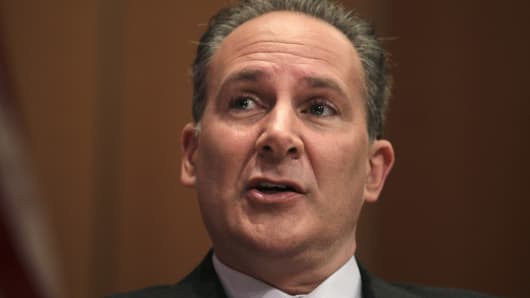Monetary easing by the Federal Reserve may not have led to inflation in the U.S. yet, but it continues to divide opinion. Euro Pacific Capital CEO Peter Schiff hit back at economist Paul Krugman on Thursday after the Nobel Laureate derided him in a New York Times column.
Schiff, a self-confessed "monetary hawk" and critic of the policy, went on the offensive after Krugman dug up an interview Schiff had on Fox News in 2009.
"If we don't reverse course, if we continue to stimulate, then we will end up with hyperinflation and it will be like Zimbabwe," Schiff said on the "Glenn Beck Show."
Krugman, took aim at Schiff and other "Austrian/Ron Paul types" in his Times blog back in December.
"Since we did indeed triple the monetary base with nothing much happening to inflation, the right lesson to draw is that their model is all wrong," he said, but added that an inflation could still jump.
(Read More: Bernanke 'Bigger Threat' Than 'Fiscal Cliff': Schiff)
The Federal Reserve announced in December that it would buy $45 billion in additional Treasurys every month, on top of the $40 billion a month in mortgage-backed securities has already committed to, taking the total size of its QE (quantitative easing) program to $85 billion a month. This stimulus has divided economists in the U.S. with fears that the tactics will cause inflation.
Schiff, in an editorial for his Euro Pacific website, countered Krugman's argument by stating that the Consumer Price Index — the figure used to measure inflation — might not be giving the full picture. To see a video on this topic go here.
"There is plenty of evidence to suggest that the CPI is essentially meaningless as it woefully under reports rising prices," he said.
(Read More: Bernanke's 'Ruinous' QE Will Lead to Rapid Inflation: SocGen's Albert Edwards)
He cited the Bureau of Labor Statistics' (BLS) Newspaper and Magazine Index which he said showed the price of magazines from 1999 to 2002 increased by 37.1 percent.
"But a perusal of the cover prices of the 10 most popular newspapers and magazines (The Wall Street Journal, Washington Post, Time, Sports Illustrated, U.S. News & World Report, Newsweek, People, NY Times, USA Today, and the LA Times) over the same time frame showed an average cover price increase of 131.5 percent (3.5 times faster than the BLS' stats)," he said. "This is not even in the same ballpark."
And that's not all. Schiff had similar concerns over the Health Insurance Index, also part of CPI, and pointed the finger at the Bureau of Labor Statistics.
"If the inaccuracy of these two components were consistent with the rest of the CPI's components, inflation could now be reported in double-digits!" He said.
(Read More: Krugman Isn't (Quite) Right About Austrian Economics)
Schiff continues to highlight that the formula for CPI has changed over the years, making it even more inaccurate, but added that U.S. trade deficits and foreign central bank dollar accumulation mean that much of the printed money in QE winds up in foreign bank vaults, not shopping centers.
"As foreign consumer goods flow in, and dollars flow out, a lid is kept on domestic prices," he said.
Foreign countries investing in US. debt means that inflation is effectively exported. Those countries recycle their surpluses into U.S. Treasuries, according to Schiff, as seen by the current low bond yields of under 2 percent.
China remains the largest holder of U.S. government debt, although Japan ramped up its investment during 2012. Over the year, Japan's pace of buying accelerated with its treasury holdings rising from $907 billion to $1.121 trillion, the Financial Times reported.
"When the flows reverse, bond prices will fall, yields will climb, and a tidal wave of dollars will wash up on American shores, drowning consumers in a sea of inflation," Schiff said.


